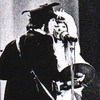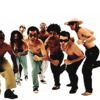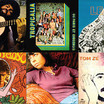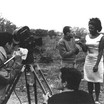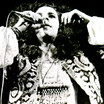Ilumencarnados seres
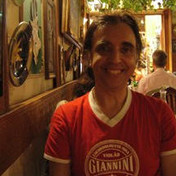
sérgio dias
Interviews
Ana de Oliveira – The Tropicalista movement wasn’t restricted to music. It presented itself mainly as a critical attitude. How would you define Tropicália?
Sérgio Dias – It was the Brazilian version of what was going on in the world around 68.
Ana de Oliveira – Was Tropicália ou Panis et Circensis, the manifesto-album, our Sargent Pepper’s Lonely Hearts Club Band?
Sérgio Dias – I wouldn’t go so far. It surely had a political content, but it was not a musical landmark like Sargent Pepper’s.
Ana de Oliveira – Please talk about your memories of the International Song Festival (FIC), when Caetano performed “É Proibido Proibir” accompanied by the Mutantes with their backs to the audience.
Sérgio Dias – We were not afraid, but surprised to see such a manifestation of rage and craziness. It was good being able to defy them from up there because there was nothing they could do. We turned our backs to them because they were throwing eggs and pieces of chairs onto the stage. It was something trivial that became political.
Ana de Oliveira – But you did have the attitude of provoking the audience …
Sérgio Dias – Not only the audience, but everything that was squared. Everything that was establishment. Laughing was our guerilla.
Ana de Oliveira – What was the importance of the psychedelic drug culture to the Mutantes’ process of formation during the Tropicalista and Post-Tropicalista phase?
Sérgio Dias – During the process of creation, none. Drugs might have tuned people’s minds, but they did not change our music this much. Listening to a Beatles’ album might have changed it more. LSD, like all the mystic drugs, propels an internal development, but perhaps drugs have brought a little too much of seriousness.
Ana de Oliveira – How was the band after Rita Lee stepped out?
Sérgio Dias – Much more instrumental. We got deeper into music. We made wonderful albums in this phase which received the pejorative label of “progressive.” Actually, it was much more about a LSD culture which the whole world was practicing, including the Beatles. Albums such as Tudo Foi Feito pelo Sol and O A e o Z, with less laughter and mockery, were musically deeper. The Beatles were also getting more serious.
Ana de Oliveira – What do you think about the Americans discovering the Mutantes in the last few years and of the fact that many of them consider you as one of the figures of the international avant-garde rock history?
Sérgio Dias – It’s as if you had had a son and suddenly you see that he is finding his ways in the world. I get e-mails from 17 year-old boys who have found me I don’t know how in the United States saying that our music is cool. To me, this is more important than Beck or Sean Lennon. It is nicer to see music survive in the heart of someone who has no political, financial or historical interest.
Ana de Oliveira – Were you fond of Jovem Guarda?
Sérgio Dias – Of course. I didn’t enjoy the music as much as the people who played it. Ronnie Von’s program had more to do with us because it was sophisticated without being elitist. Erasmo and Roberto Carlos have always been great. And open. They were not like the MPB group who would make signed petitions while you were playing to kick you out of the festival.
Ana de Oliveira – What facts marked you during the Tropicalista period?
Sérgio Dias – Happiness was constant. Comparing to Tropicália, nowadays you will hardly become Captain Marvel out of something. It is not nostalgia, it’s just that there was a constant search for information, even in the streets. Everything was much simpler and honest. One of the things I remember most is the people’s revolutionary look, Caetano, Gil, Rita. We’re still settling down after the 60’s earthquake. We have destroyed the family putting nothing in its place. Mankind is not ready to live the big family. It was all a rehearsal. But it was beautiful to watch it.






